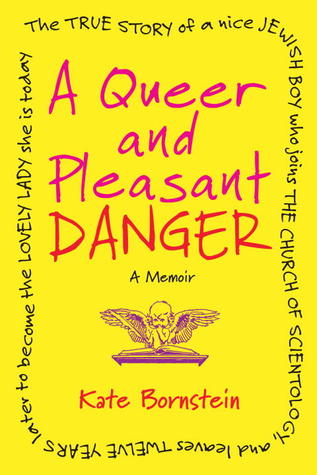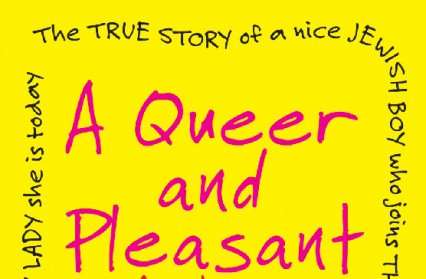BJ Epstein reviews A Queer and Pleasant Danger, the latest novel from multi-talented creative and gender theorist Kate Bornstein.

Kate Bornstein is in search of a daddy. She wants both a traditional father figure and also an alpha to dominate her beta. In her new memoir, Bornstein explores this need, her quest for the ‘bottom space’, setting it within the larger scope of her life.
A Queer and Pleasant Danger is a brave and very honest book, which Bornstein addresses to her estranged daughter and grandchildren. In it, Bornstein discusses her life on the borderlines. Born male, Jewish, and overweight, Bornstein eventually found her way to Scientology, and then beyond it, and also ended up turning thin, female, sadomasochistic, and suffering from a borderline personality disorder. While some of these transitions were harder than others, Bornstein seems to thrive on both the journey and on the fact that the destinations aren’t always so clear-cut.
It might seem easy to mock Scientology, but Kate Bornstein explains why the cult/religion was so important to her: ‘Prior to my life in Scientology I’d been trying to learn boy at the same time I was secretly trying to learn girl. I was successful as a boy, and I never showed anyone the girl I believed myself to be. The battle of the sexes raged in my mind, day and night. I was twenty-two years old when Scientology told me that life was much simpler than that.’ For a young transgender person, Scientology was appealing because Scientologists believe that people are genderless spiritual beings and gender is just a bodily feature that ultimately doesn’t matter as much as the spirit. Bornstein felt that this was the ‘anchor’ and ‘life preserver’ she needed at that time in her life.
It was through Scientology that Kate Bornstein met her first wife, who was a strong personality who made Kate, then Al, feel like a girl; this was one of the first father figures Bornstein found, along with the founder of Scientology, L. Ron Hubbard. And it was also in part through Scientology that Bornstein began to grow more confident, and also started to allow herself to explore gender more, even if in secret. So even if the religion, in the end, proved unhealthy for Bornstein, it was also a very significant part of her life, which is why much space is devoted to it.
Another significant aspect of the memoir is Bornstein’s desire for pain, which perhaps stems from the feeling that she has to punish herself for being transgender. Cutting herself, being anorexic, and planning suicide attempts gradually develop into her discovering the joy of sadomasochism. In learning to accept and even revel in pain, Bornstein also learns to accept and revel in herself. And along the way, she also finds additional alpha daddies who will top her and give her the pain she needs and longs for.
Ultimately, while there is much that is interesting or touching in her memoir, it doesn’t quite feel as though everything has been pulled together by the end. While one could indeed argue that life is messy and that the disparate threads a person experiences (weight, gender, sexuality, family, friends, religion, career, mental health, etc) don’t always create a coherent whole, memoirs should generally make something out of the chaos. Kate Bornstein writes well and explores many difficult topics, but there is no overall feeling that once the reader has closed the book, she or he has really understood who and what Bornstein is. Perhaps this is because issues of gender are given short-shrift – and this, in turn, maybe because Bornstein has explored them in-depth elsewhere, notably in Gender Outlaw – and thus a reader unfamiliar with Bornstein from other texts might be confused.
Still, as Kate Bornstein puts it, ‘It’s breathtaking fun, setting your own course in life.’ And Bornstein has definitely done that, and the extent to which she has might leave some readers gasping for breath.
A Queer and Pleasent Danger by Kate Bornstein is available now.
BJ Epstein has written a number of pieces for Wales Arts Review.











